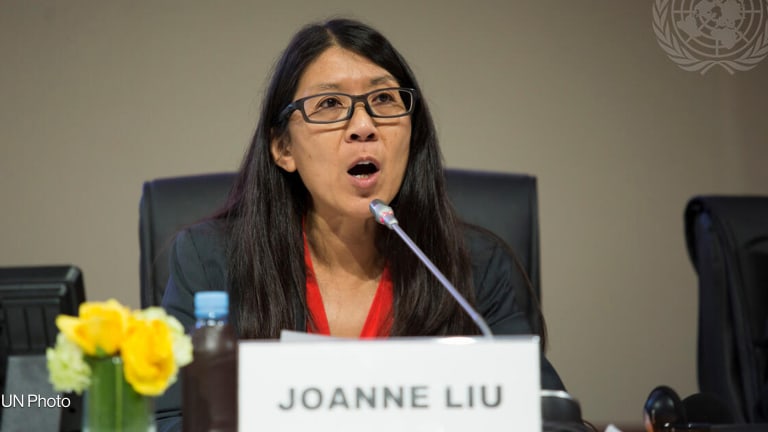
The United Nations secretary-general race might soon be over, before it ever actually took off.
“If you look at the U.N. election page [online], you only see António Guterres, but there are a lot of other candidates. We don't know exactly how to participate. Is it through the General Assembly, or the Security Council?” said Colombe Cahen-Salvador, a co-founder of the new political grassroots movement Forward, which is currently focused on diversifying the secretary-general race.
“Countries are a bit fearful of nominating candidates themselves when they know that at the end of the day, the P5 [permanent members of the Security Council] will be the one deciding who the next secretary-general is. It's a democratic issue but also a structural issue of who really has a say in this process,” Cahen-Salvador continued.
The General Assembly is hosting an “informal dialogue” Friday morning with secretary-general candidates, but the meeting is set to feature only Guterres, who announced his bid for a second five-year term in January.
Arora Akanksha, a 34-year-old Indian Canadian and U.N. staffer, is among a handful of self-nominated candidates who have thrown their hats in the race. In April, Forward nominated Rosalía Arteaga, an Ecuadorian politician who briefly served as the country’s president, after approaching her on Twitter.
“We hope to send a strong shock wave so that the next time around, the process is different and that member states have to confront their own contradictions.”
— Colombe Cahen-Salvador, co-founder, ForwardNeither the General Assembly nor the Security Council — which will ultimately vote on the next U.N. leader — has formally acknowledged these candidates, according to Akanksha and Forward organizers.
General Assembly President Volkan Bozkir said during a press briefing Tuesday that there are seven secretary-general “applicants” and one “candidate,” since candidates must first receive a joint letter from the presidents of the GA and Security Council. He acknowledged “there are some gray areas” in the U.N. resolution detailing the process.
U.N. member states have traditionally nominated secretary-general competitors, putting forward five final candidates during the previous selection process in October 2016. Official guidelines, though, do not explicitly prohibit candidates from self-nominating or being nominated by civil society organizations.
Akanksha said only seven governments — none of which are from the global north — responded to her emails in April asking for time to present her candidacy.
“What is the harm in having an open election? You promote democracy to the entire world and then do not preach it. How are there red flags that there is no other candidate presented by any other country, and then the self-nominated ones are not considered?” Akanksha said. “What are they so afraid of? I have never heard of an election with just one candidate.”
The Security Council’s P5 members are likely to select Guterres before the fall deadline, according to Ben Donaldson, head of campaigns at the United Nations Association – UK and a member of the 1 for 7 Billion civil society campaign.
“I think it will be done by the end of June. There were still candidates coming out as late as September last time around, but this time around the Security Council has said they intend to begin their deliberations in May or June. This all plays to the incumbent’s advantage,” Donaldson said.
Cahen-Salvador questioned the lack of transparency around the exact timing of the selection.
“How can people be expected to trust the U.N., work with the U.N., or believe in the U.N. when the leader of the U.N. is chosen — we don't know when and we don't know how?” Cahen-Salvador said.
Powerful member states’ overall approval of Guterres’ first term — which was compromised by the previous U.S. administration’s reluctance to support the U.N. and then by the COVID-19 pandemic — is one political factor that has dissuaded governments from nominating other candidates, Donaldson said. Governments want to give him a chance to continue his work without such complicating factors, he added.
“I don’t think anyone wants to be the first to challenge a candidate who has a lot of momentum behind him. But this shows a concerning amount of groupthink and lack of imagination that … no one is willing to put up an alternative candidate to challenge Guterres,” Donaldson said.
Opinion: Already, the UN secretary-general election is compromised
With countries prematurely endorsing Guterres in his bid for a second term, U.N. insiders know that the playing field has been skewed from the start. Time is running out for this to change.
Independent candidates’ struggle to successfully navigate the selection is “at odds” with the push during the 2015-2016 race for a more transparent, inclusive process, he continued. Donaldson called for the GA to issue guidance on this issue before the selection process in 2026.
Cahen-Salvador, meanwhile, said that her campaign continues to wait for the GA and Security Council to acknowledge Arteaga’s candidacy. Arteaga said this week that while Ecuador supports her bid, she prefers to be considered a civil society candidate.
“When you have a former head of state being introduced as a SG candidate, if she's not even considered for it or if members of the U.N. cannot actually vote on it, it looks pretty ridiculous for the U.N.,” Cahen-Salvador said. “We hope to send a strong shock wave so that the next time around, the process is different and that member states have to confront their own contradictions.”








